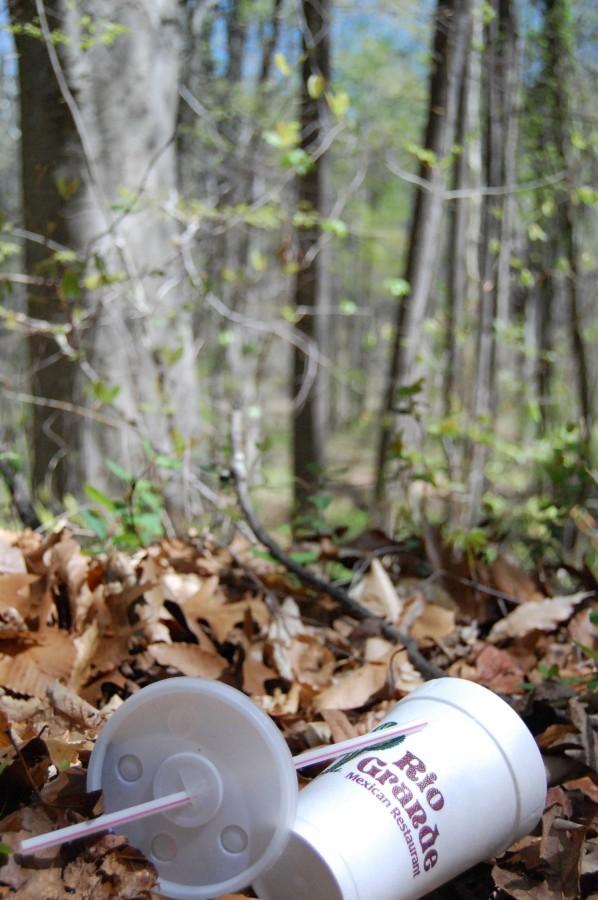The Guilford woods comprise approximately one-third of the college’s campus. This 90-acre parcel of land represents a rare resource of undeveloped wilderness amidst the concrete sprawl of greater Greensboro. The prevalence of litter in the woods is a long-standing issue among some faculty, students, and staff who wonder why trash accumulates and what should be done about it.
“It drives me crazy,” said Vice President for Student Affairs and Dean of Students Aaron Fetrow. “Trash in our woods sends a message that is very opposite from who we are. We are in the midst of a year of sustainability, but then we have all this crap in our woods.”
Community members relate to the woods in many different ways. A half-acre garden is being developed in the meadows, and beehives are in use. Many people run and walk along the trails and hold bonfires during the weekends.
“I go out there two to three times a week,” said sophomore Russell Connelly. “I like to walk, and it’s really peaceful in the woods.”
Junior Sarah Foster has never been to the woods.
“I have absolutely never been out there,” Foster said. “But it’s rumored that people go out there to smoke pot.”
Sam Kelly, sophomore and member of the Outdoors Club, believes that such rumored activities are responsible for a great deal of the refuse.
“Most of the trash comes from people partying in the woods,” said Kelly. “Most people are high or drunk, and it’s dark out there, so it’s out-of-sight, out-of-mind.”
The Outdoors Club takes on clean-up initiatives one to two times per semester. Other clubs, including the Guilford College Republicans and Photo Club, have been part of organizing clean-ups.
“We can take out ten or more big plastic trash bags,” said sophomore Lizzie Ross, a member of the Outdoors Club. “It’s pretty ridiculous.”
Students concerned about the trash have suggested placing waste receptacles along the trails and working to emphasize more clean-up initiatives.
“Then again, that just addresses the symptom and not the cause,” said Kelly.
Fetrow believes that part of the cause is first-years who party in the woods and have not yet learned to love and respect the woods.
“This will probably be an unpopular opinion, but let’s be real,” said Fetrow. “Which of the residence halls are the ones that get trashed? Binford and Milner.”
Eric Mortensen, assistant professor of religious studies, recognizes partying as one of the causes but also identifies the ideological roots that allow trash to accumulate.
“The idea that someone will clean up my mess is entitlement,” said Mortensen. “It’s possible that as intoxication levels go up, so does a sense of entitlement. This is also part of a larger cultural phenomenon. We have an anthropocentric idea that the woods are here to be used by us.”
Stewardship is one of the college’s core values, and leaving trash behind is in contention with this ideal.
“My idea of environmental sustainability is stewardship of the land that we are blessed with,” said Jim Dees, environmental sustainability coordinator. “I don’t think smoking dope and drinking beer and leaving all your crap represents a very meaningful relationship with a place, and it’s certainly not good stewardship.”
David Petree, landscaping and grounds manager, sees litter as a larger issue on campus.
“If you were to walk in my shoes or my staff’s shoes, you would have a hard time not getting depressed by the amount of litter we pick up on this campus,” said Petree. “If we were to stop picking up trash for a month, the health department would shut us down.”
Tammy Alt, associate dean for campus life, believes that picking up trash after students just enables the behavior.
“My question to the community is how do we take care of this beautiful natural resource?” said Alt. “And as much as people are going to get tired of hearing me say it, peer accountability is one of those ways.”
At this point, no consensus has been reached as to the best course of action to deal with litter in the woods. With trash continuing to accumulate, greater awareness of the implications for the community and the land at stake may help to spark dialogue and change.

